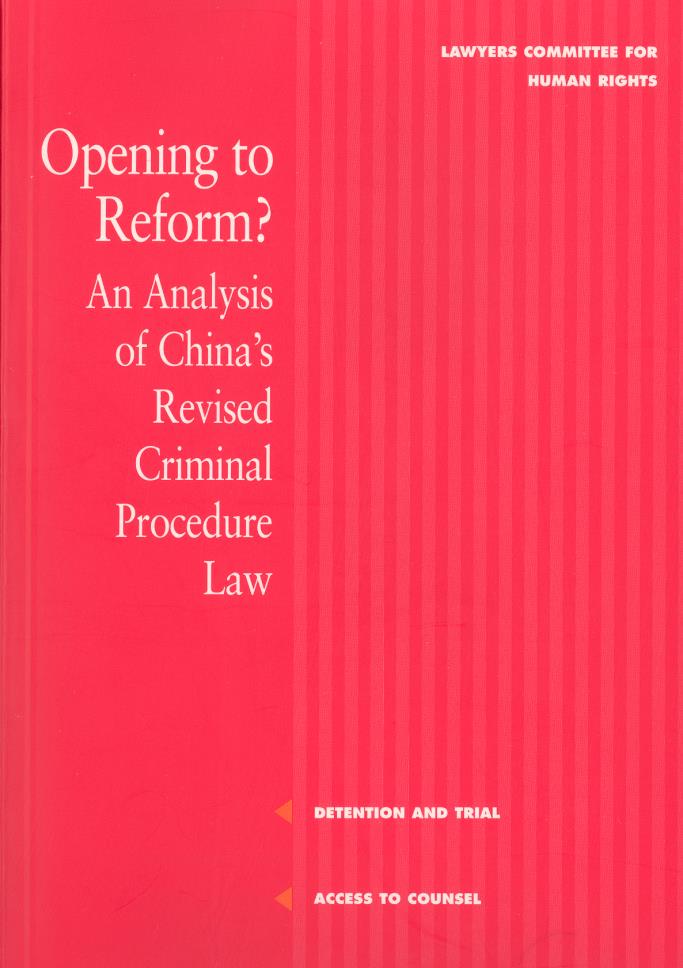
LAWYERS COMMITTEE FOR HUMAN RIGHTS Opening to Reform? An Analysis of China's Revised Criminal Procedure Law DETENTION AND TRIAL ACCESS TO COUNSEL
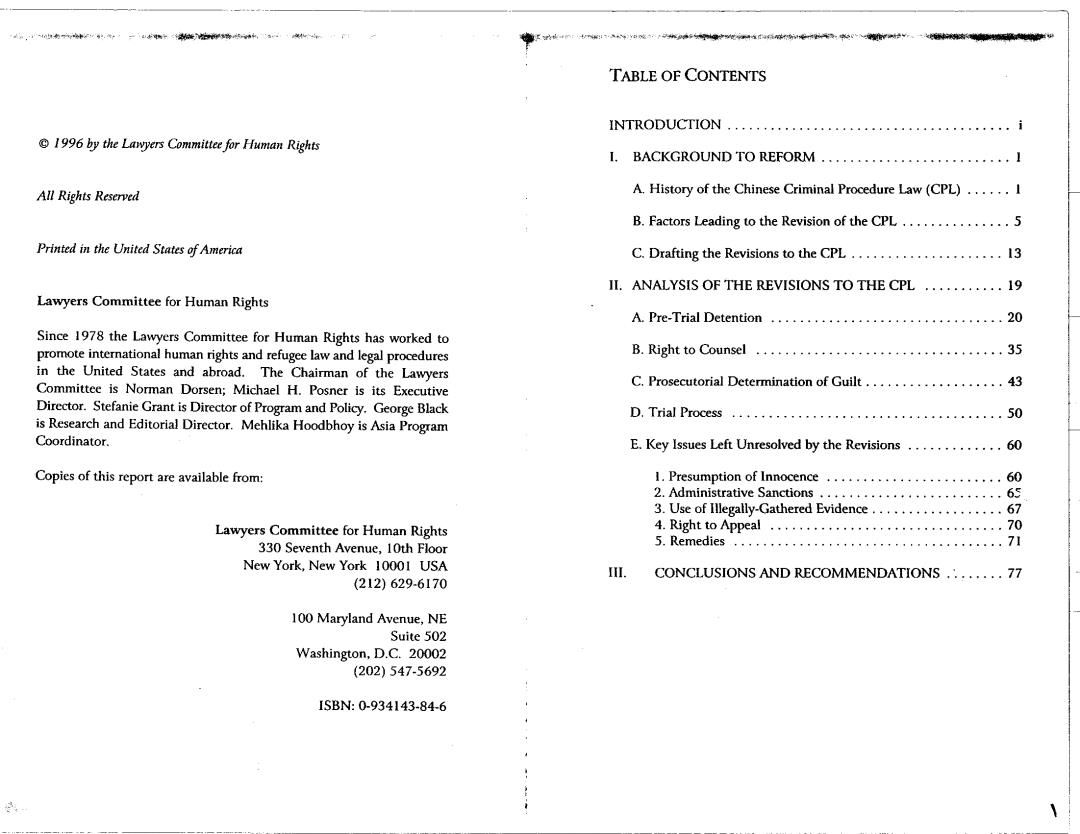
TABLE OF CONTENTS INTRODUCTION.…i 1996 by the Lawyers Committee for Human Rights L.BACKGROUND TO REFORM...····1 All Rights Reserved A.History of the Chinese Criminal Procedure Law(CPL)......I B.Factors Leading to the Revision of the CPL...............5 Printed in the United States of America C.Drafting the Revisions to the CPL.....................13 II.ANALYSIS OF THE REVISIONS TO THE CPL...........19 Lawyers Committee for Human Rights A.Pre-Trial Detention................................20 Since 1978 the Lawyers Committee for Human Rights has worked to promote international human rights and refugee law and legal procedures B.Right to Counsel ................. 35 in the United States and abroad.The Chairman of the Lawyers Committee is Norman Dorsen;Michael H.Posner is its Executive C.Prosecutorial Determination of Guilt................... 43 Director.Stefanie Grant is Director of Program and Policy.George Black is Research and Editorial Director.Mehlika Hoodbhoy is Asia Program D.Trial Process .....................................50 Coordinator. E.Key Issues Left Unresolved by the Revisions .............60 Copies of this report are available from: 1.Presumption of Innocence........................60 2.Administrative Sanctions.........................65 3.Use of Illegally-Gathered Evidence..................67 Lawyers Committee for Human Rights 4.Right to Appeal................................70 330 Seventh Avenue,10th Floor 5.Remedies...........7l New York,New York 10001 USA III. (212)629-6I70 CONCLUSIONS AND RECOMMENDATIONS........77 100 Maryland Avenue,NE Suite 502 Washington,D.C.20002 (202)547-5692 ISBN:0-934143-84-6
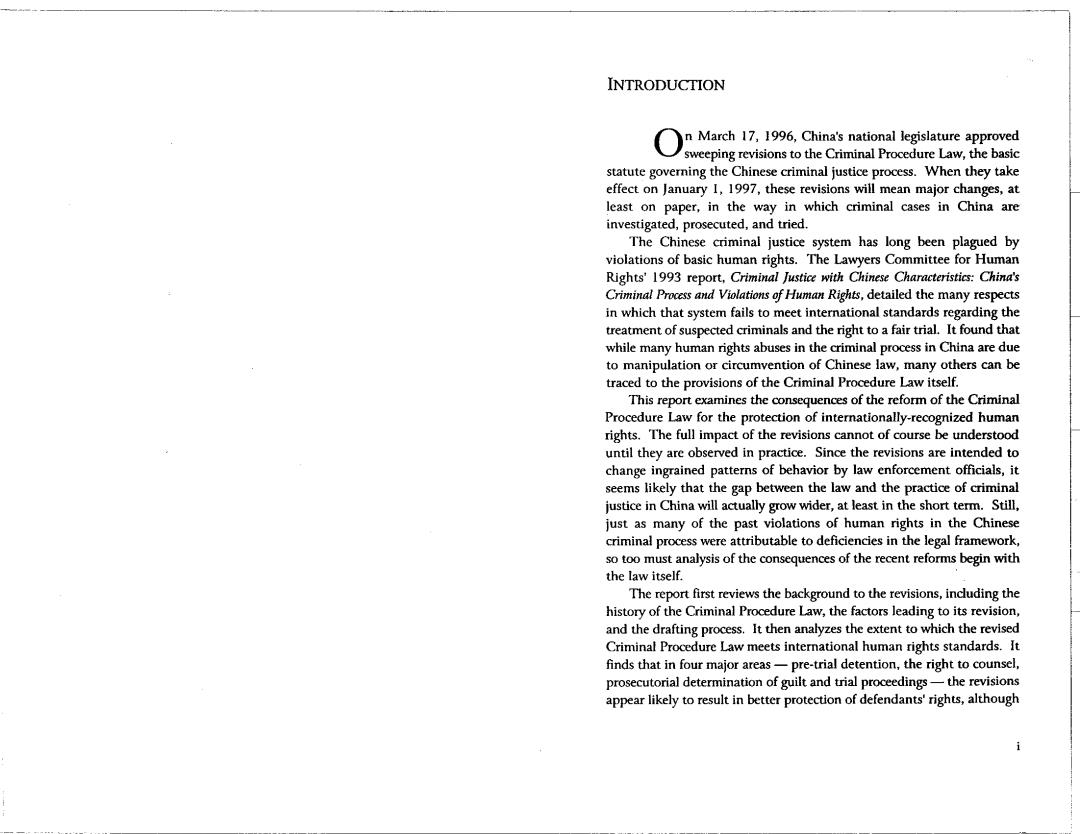
INTRODUCTION March 17 Chins naional esture proved sweeping revisions to the Criminal Procedure Law,the basic statute governing the Chinese criminal justice process.When they take effect on January 1,1997,these revisions will mean major changes,at least on paper,in the way in which criminal cases in China are investigated,prosecuted,and tried. The Chinese criminal justice system has long been plagued by violations of basic human rights.The Lawyers Committee for Human Rights'1993 report,Criminal Justice with Chinese Characteristics:China's Criminal Process and Violations of Human Rights,detailed the many respects in which that system fails to meet international standards regarding the treatment of suspected criminals and the right to a fair trial.It found that while many human rights abuses in the criminal process in China are due to manipulation or circumvention of Chinese law,many others can be traced to the provisions of the Criminal Procedure Law itself. This report examines the consequences of the reform of the Criminal Procedure Law for the protection of internationally-recognized human rights.The full impact of the revisions cannot of course be understood until they are observed in practice.Since the revisions are intended to change ingrained patterns of behavior by law enforcement officials,it seems likely that the gap between the law and the practice of criminal justice in China will actually grow wider,at least in the short term.Still, just as many of the past violations of human rights in the Chinese criminal process were attributable to deficiencies in the legal framework, so too must analysis of the consequences of the recent reforms begin with the law itself. The report first reviews the background to the revisions,including the history of the Criminal Procedure Law,the factors leading to its revision, and the drafting process.It then analyzes the extent to which the revised Criminal Procedure Law meets international human rights standards.It finds that in four major areas-pre-trial detention,the right to counsel, prosecutorial determination of guilt and trial proceedings-the revisions appear likely to result in better protection of defendants'rights,although
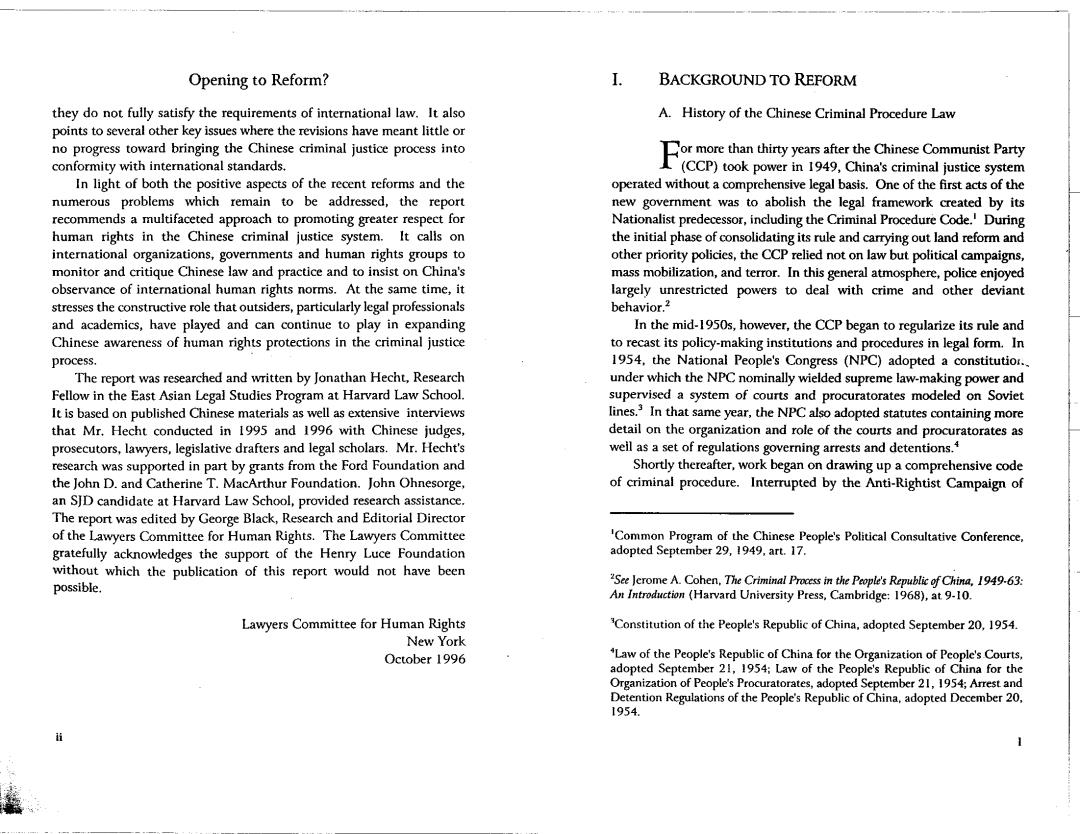
Opening to Reform? I. BACKGROUND TO REFORM they do not fully satisfy the requirements of international law.It also A.History of the Chinese Criminal Procedure Law points to several other key issues where the revisions have meant little or no progress toward bringing the Chinese criminal justice process into or more than thirty years after the Chinese Communist Party conformity with international standards. (CCP)took power in 1949,China's criminal justice system In light of both the positive aspects of the recent reforms and the operated without a comprehensive legal basis.One of the first acts of the numerous problems which remain to be addressed,the report new government was to abolish the legal framework created by its recommends a multifaceted approach to promoting greater respect for Nationalist predecessor,including the Criminal Procedure Code.'During human rights in the Chinese criminal justice system.It calls on the initial phase of consolidating its rule and carrying out land reform and international organizations,governments and human rights groups to other priority policies,the CCP relied not on law but political campaigns, monitor and critique Chinese law and practice and to insist on China's mass mobilization,and terror.In this general atmosphere,police enjoyed observance of international human rights norms.At the same time,it largely unrestricted powers to deal with crime and other deviant stresses the constructive role that outsiders,particularly legal professionals behavior. and academics,have played and can continue to play in expanding In the mid-1950s,however,the CCP began to regularize its rule and Chinese awareness of human rights protections in the criminal justice to recast its policy-making institutions and procedures in legal form.In process. 1954.the National People's Congress (NPC)adopted a constitutior.. The report was researched and written by Jonathan Hecht,Research under which the NPC nominally wielded supreme law-making power and Fellow in the East Asian Legal Studies Program at Harvard Law School. supervised a system of courts and procuratorates modeled on Soviet It is based on published Chinese materials as well as extensive interviews lines.In that same year,the NPC also adopted statutes containing more that Mr.Hecht conducted in 1995 and 1996 with Chinese judges, detail on the organization and role of the courts and procuratorates as prosecutors,lawyers,legislative drafters and legal scholars.Mr.Hecht's weil as a set of regulations governing arrests and detentions. research was supported in part by grants from the Ford Foundation and Shortly thereafter,work began on drawing up a comprehensive code the John D.and Catherine T.MacArthur Foundation.John Ohnesorge, of criminal procedure.Interrupted by the Anti-Rightist Campaign of an SJD candidate at Harvard Law School,provided research assistance. The report was edited by George Black,Research and Editorial Director of the Lawyers Committee for Human Rights.The Lawyers Committee Common Program of the Chinese People's Political Consultative Conference. gratefully acknowledges the support of the Henry Luce Foundation adopted September 29,1949.art.17. without which the publication of this report would not have been possible. See Jerome A.Cohen.The Criminal Process in the People's Republic of China,1949-63: An Introduction (Harvard University Press,Cambridge:1968),at 9-10. Lawyers Committee for Human Rights Constitution of the People's Republic of China.adopted September 20,1954. New York October 1996 Law of the People's Republic of China for the Organization of People's Courts, adopted September 21,1954;Law of the People's Republic of China for the Organization of People's Procuratorates,adopted September 21,1954;Arrest and Detention Regulations of the People's Republic of China,adopted December 20, 1954
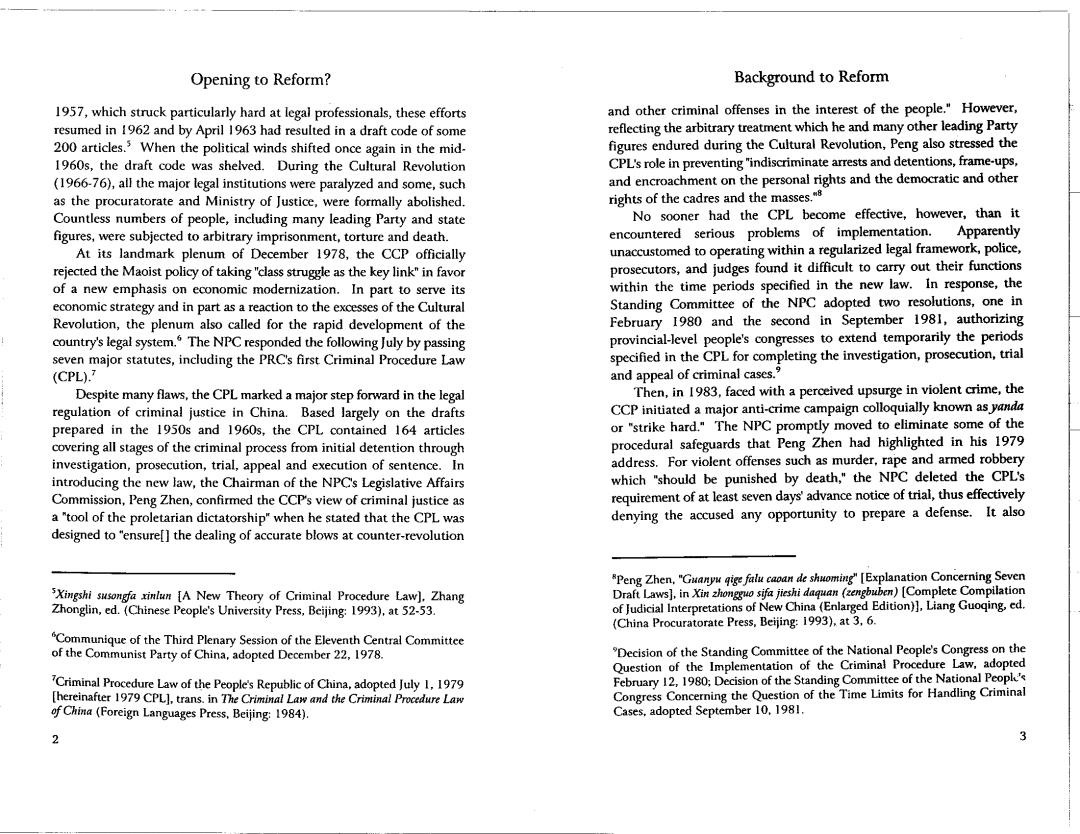
Opening to Reform? Background to Reform 1957,which struck particularly hard at legal professionals,these efforts and other criminal offenses in the interest of the people."However, resumed in 1962 and by April 1963 had resulted in a draft code of some reflecting the arbitrary treatment which he and many other leading Party 200 articles.3 When the political winds shifted once again in the mid- figures endured during the Cultural Revolution,Peng also stressed the 1960s,the draft code was shelved.During the Cultural Revolution CPL's role in preventing "indiscriminate arrests and detentions,frame-ups, (1966-76),all the major legal institutions were paralyzed and some,such and encroachment on the personal rights and the democratic and other as the procuratorate and Ministry of Justice,were formally abolished. rights of the cadres and the masses." Countless numbers of people,including many leading Party and state No sooner had the CPL become effective,however,than it figures,were subjected to arbitrary imprisonment,torture and death. encountered serious problems of implementation.Apparently At its landmark plenum of December 1978,the CCP officially unaccustomed to operating within a regularized legal framework,police, rejected the Maoist policy of taking"class struggle as the key link"in favor prosecutors,and judges found it difficult to carry out their functions of a new emphasis on economic modernization.In part to serve its within the time periods specified in the new law.In response,the economic strategy and in part as a reaction to the excesses of the Cultural Standing Committee of the NPC adopted two resolutions,one in Revolution,the plenum also called for the rapid development of the February 1980 and the second in September 1981,authorizing country's legal system.The NPC responded the following July by passing provincial-level people's congresses to extend temporarily the periods seven major statutes,including the PRC's first Criminal Procedure Law specified in the CPL for completing the investigation,prosecution,trial (CPL)." and appeal of criminal cases.? Despite many flaws,the CPL marked a major step forward in the legal Then,in 1983,faced with a perceived upsurge in violent crime,the regulation of criminal justice in China.Based largely on the drafts CCP initiated a major anti-crime campaign colloquially known as yanda prepared in the 1950s and 1960s,the CPL contained 164 articles or "strike hard."The NPC promptly moved to eliminate some of the covering all stages of the criminal process from initial detention through procedural safeguards that Peng Zhen had highlighted in his 1979 investigation,prosecution,trial,appeal and execution of sentence.In address.For violent offenses such as murder,rape and armed robbery introducing the new law,the Chairman of the NPC's Legislative Affairs which "should be punished by death,"the NPC deleted the CPL's Commission,Peng Zhen,confirmed the CCP's view of criminal justice as requirement of at least seven days'advance notice of trial,thus effectively a "tool of the proletarian dictatorship"when he stated that the CPL was denying the accused any opportunity to prepare a defense.It also designed to "ensure[]the dealing of accurate blows at counter-revolution Peng Zhen,"Guanyu qige falu caoan de shuoming"[Explanation Concerning Seven sXingshi susongfa rinlun [A New Theory of Criminal Procedure Law].Zhang Draft Laws],in Xin zhongguo sifa jieshi daquan (zengbuben)[Complete Compilation Zhonglin,ed.(Chinese People's University Press,Beijing:1993),at 52-53. of Judicial Interpretations of New China (Enlarged Edition)],Liang Guoqing,ed. (China Procuratorate Press,Beijing:1993),at 3,6. Communique of the Third Plenary Session of the Eleventh Central Committee of the Communist Party of China,adopted December 22,1978. Decision of the Standing Committee of the National People's Congress on the Question of the Implementation of the Criminal Procedure Law,adopted Criminal Procedure Law of the People's Republic of China,adopted July 1,1979 February 12,1980;Decision of the Standing Committee of the National Peopl's [hereinafter 1979 CPL].trans.in The Criminal Law and the Criminal Procedure Law Congress Concerning the Question of the Time Limits for Handling Criminal of China (Foreign Languages Press,Beijing:1984). Cases,adopted September 10.1981. 3